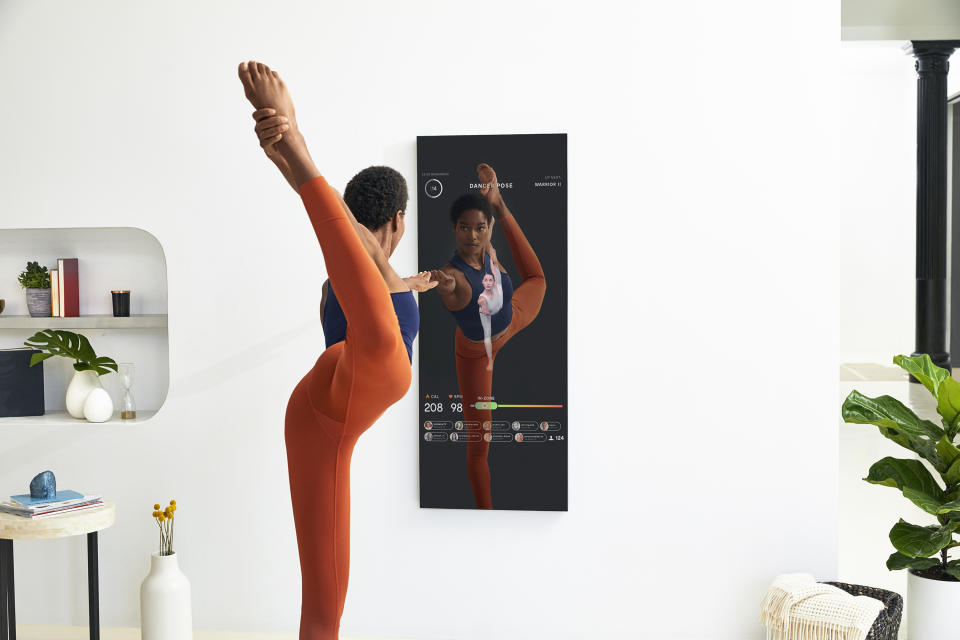Meet your new personal trainer, a £1150 mirror
By Melody Hahm
A mirror is a statement piece at best and a source of self-scrutiny at worst.
But Brynn Putnam, a former dancer with the New York City Ballet, had the idea to transform a functional mirror into an in-home gym complete with a virtual trainer.
The company is aptly named, Mirror and launched on Thursday morning.
A Mirror retails for $1,495 (around £1150), plus a monthly $39 ( around £30) subscription for classes.
![A boxing class through Mirror [Photo: Mirror]](https://s.yimg.com/ny/api/res/1.2/uD3AKN3xGyW0HWp0hj3IjA--/YXBwaWQ9aGlnaGxhbmRlcjt3PTk2MDtoPTY0MA--/https://media.zenfs.com/en/homerun/feed_manager_auto_publish_494/ceab14ba6a3320aa4a58689efa7f3267)
The company streams 50 live workouts, ranging from boxing to barre, each week from its production studio in New York. The display has an LCD panel, surround-sound speakers, camera, camera lens for privacy, microphone, and one-way glass.
Meanwhile, a white glove delivery team will come to your home and either mount the mirror on the wall or set it on a stand.
Putnam is also the CEO of Refine Method, a boutique studio chain with three locations across New York City. Since founding the company in 2010, she has built a network of trainers who are also teaching Mirror classes.
“I found that I was a gym owner who was struggling to work out,” Putnam told Yahoo Finance. “As a busy entrepreneur and new mum, it was increasingly difficult for me to get to my own gyms to fit in a workout. So I started to think about how we could bring the studio experience in-home.”
“The aha moment came when we put a bunch of regular mirrors in our fitness studios and our clients said it was the best thing we had done all year. We realised that the mirror was the perfect tool to build a nearly invisible, interactive home gym.”
The boutique bright spot
The popularity of gyms continues to rise. According to figures included in the 2018 State of the UK Fitness Industry Report, the UK fitness market is estimated to be worth £5billion, with one in every seven Brits now having a gym membership.
But the fastest-growing segment is the boutique fitness studio industry, which offers specialised and focused workouts, which is also noted in the report.
Of the 54 million Americans who claimed membership of a health club in 2014, 42% were members of boutique studios. While back in the UK, Gymbox, which offers 15 different kinds of yoga and pilates classes, revealed 28% revenue growth in 2016 and plans to open three new sites.
“If this trend continues in the years to come, studios may reap the profits of serving a consumer base that seems to be overlooked by other commercial clubs,” according to IHRSA’s report.
Putnam is tapping into that very consumer.
“The market is large and growing,” she said. “We have a growing population of millennials who have grown accustomed to higher quality classes, instruction and the experience of boutique studios. They are now finding it more challenging to work out due to geography, cost or schedule. That’s a population that’s going to age into demanding higher quality workout experiences at home.”

The competitive landscape
Mirror also announced on Thursday that it had raised an additional $25 million (£19 million) from existing investor Spark Capital, bringing the company’s total funding to $38 million (£29 million).
While Mirror may offer a differentiated product, it faces stiff competition from other players in the in-home fitness market.
At first, Mirror actually started with the idea of an iPhone app like Aaptiv, which offers audio-based classes. Aaptiv closed its Series C round earlier this year, raising $52 million (£40 million) to date from backers like Amazon’s Alexa Fund and Disney.
Former Google employees founded Fiit in the U.K., where you can take classes through a mobile app that connects to a smart TV.
“There are some competitors who are trying to create connected fitness product…smarter treadmills, bikes and weight machines. We’re really vying to be the next screen in your life,” said Putnam.
“For us, we don’t want to be the next treadmill in your home. We want to be the screen you go to for all personalised premium content.”
The future of fitness?
This appetite for pricey fitness offerings, like Mirror indicates to Putnam that we haven’t yet reached peak fitness and there is still plenty of opportunity ahead.
“Users are showing a great passion for health and wellness and allocating more and more of their leisure and time to health and wellness activities. Our users will go to a class or have a Mirror at home,” she said.
While Mirror may be trying to entice trend-seeking millennials, it can also attract retirees who want to stay healthy without having to trek to the gym.
Follow us on Instagram and Facebook for non-stop inspiration delivered fresh to your feed, every day. For Twitter updates, follow @YahooStyleUK.
Read more from Yahoo Style UK:
Woman proves fitness selfies aren’t just for one body type
Forget fasting, ‘time-restricted feeding’ is the way to double fat loss, study finds
Your 10,000 steps a day goal appears to be built on bad science

